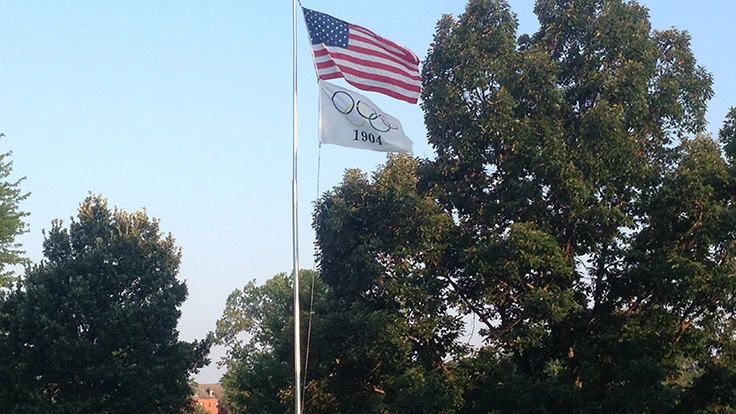
Two flags fly outside the Glen Echo Country Club pro shop. The top flag honors the United States. The bottom flag displays the world’s five most recognizable rings.
 |
The club’s Olympic history has become a topic as golf returns to the Games for the first time since Canadian George Lyon defeated reigning U.S. Amateur champion Chandler Egan in the 1904 gold medal match at Glen Echo, an enduring club in an urbanized section of St. Louis. Glen Echo is the only American course to host the tournament – Fairbanks Ranch Country Club outside San Diego hosted equestrian events in 1984 – and superintendent Joe Wachter says the Olympic connection matters to the club’s membership and staff. “We have a dedicated membership who loves the club, loves its history,” he says. “We have a lot of other things, but that Olympic gold medal and those golf medal matches that took place in 1904 are pretty important.”
A new Gil Hanse-designed course in Rio maintained by superintendent Neil Cleverly and his crew is hosting the men’s and women’s Olympic tournaments next month in Rio. The scene in Rio will contrast what Glen Echo experienced in 1904. Competitors, including Lyon, were amateurs and many lived within a short distance of St. Louis. TV didn’t exist. Only men participated. The stimpmeter was three decades from its implementation.
Glen Echo’s layout, though, hasn’t changed much. Wachter says 11 holes are “practically the same” as they appeared in 1904. “A majority of those greens are all in the same location,” he adds. “They might not necessarily be the same shape and size. There were probably 30 or 40 changes made to the course in the first 30 years and there have only been a couple of changes made in the last 80 years.” A sloping common fairway between the 15th and 18th holes and cross bunkers are among the features Olympic participants faced that no longer exist, while trees went from being planted in clumps to now lining parts of the course.
 |
Brothers Jim and Robert Foulis designed Glen Echo, which opened in 1901. The pair hailed from St. Andrews, Scotland, where they studied under Old Tom Morris. They established roots in the American Midwest and designed multiple courses in St. Louis. Jim left the area to become the head pro at Chicago Golf Club in the early 1900s, but Robert remained in St. Louis and served as Glen Echo’s head greenkeeper from 1901-07, meaning he prepared the course for the Olympic tournament.
A late arriver to the golf industry, Wachter knew Glen Echo’s Olympic history when the club hired him as superintendent in August 2008. He has studied the work of the Foulis brothers, who also designed nearby Normandie Golf Club. Following in a lineage of superintendents/greenkeepers that includes Robert Foulis makes Wachter an agronomic descendant of Old Tom Morris. Wachter’s management style blends 1904 necessities with 2016 communication skills. He relishes working alongside crew members, yet his Twitter and Instagram feeds and blog are among the industry’s best. “I think we’re all descendants of Old Tom,” he says. Longevity among Glen Echo employees and members is the norm, with assistant superintendent Skip Fierro holding his position since 1981.
“I’m attempting to try to remove some things,” Wachter says. “I’m trying to remove the intermediate. There were never intermediates back in the day. It’s an additional mower. It’s a seven-hour or eight-hour day a job. It’s one of those thing that’s not really old-school. It’s new-school. We have tried to simplify our operation. The word sustainable has been thrown around, but it’s truly sustainable because we have sustained the club in some tough periods and we have a big hand in that because we have the largest budget of anybody in the club. It’s our responsibility.”
It’s unlikely the Olympics will return to St. Louis or Glen Echo, but Wachter and his team are experiencing multiple tournament buzzes this summer. The club conducted its member-guest in mid-July, the Missouri Sports of Hall Fame celebrity golf outing and Olympic gala is July 29, and the club hosts the Metropolitan Amateur Golf Association Championship Aug. 4-6.
“My adrenaline has been flowing strong for two or three weeks,” Wachter says. “I know I’m going to come down pretty soon. I think everybody takes pride in that and challenges themselves every year, and to hear them say, ‘It’s never been better.’ Well, ‘You said that last year.’ That’s great. The only problem is you’re only as good as that day because the next day or two days or three days you could start killing stuff or stuff can start going the other way.”
Six days after Glen Echo’s summer tournament sprint concludes, a golf tournament in Rio begins. The television ratings at least one American club will be strong. “I’m sure I’ll watch,” Wachter says. “The superintendent there seems like a really good guy. I think the folks going down there will put on a good show.”
Guy Cipriano is GCI’s associate editor.
Get curated news on YOUR industry.
Enter your email to receive our newsletters.Latest from Golf Course Industry
- GCSAA’s Health in Action 5K/2K reaches fundraising goal
- Landscapes Golf Management to participate in data analyzation initiative
- Reel Turf Techs: Carl Michael
- Atlanta Athletic Club approves funding for master plan
- Maximizing Cultural Practices and Agronomic Benefits with Minimal Surface Disruption
- Real Answers about Spray Nozzle Choices
- From the Course to the Factory: How Customer Insights Drive Innovation
- New & Proven Enzyme Strategies for Sprayable Thatch Management





